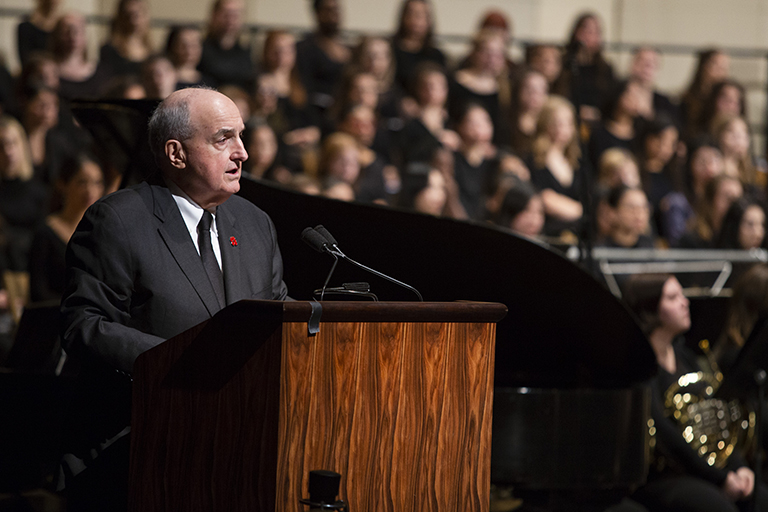World War I: The End and the Aftermath
One hundred years ago on this day in 1918, and just four hours ago, the guns fell silent all over the world. One of the most devastating wars in human history was over. It is estimated that 40 million soldiers and civilians were killed or wounded in the First World War. It is a day, a century later, that is still observed with solemnity and mourning around the world. In the United States, today is known as Veterans Day. In the United Kingdom and most of the British Commonwealth, Remembrance Day. In France, Armistice Day.
It has been said of the First World War that it was "the great seminal catastrophe of the twentieth century, because it led to so many further catastrophes."1 Four great empires collapsed with geopolitical consequences that endure to this day. The one remaining empire was exhausted and depleted. A world weakened by the harsh privations of war was soon swept and devastated by an outbreak of deadly influenza that killed over 50 million. And the First World War was but the precursor to the even more deadly Second World War that killed around 80 million soldiers and civilians around the world, and brought the world the unspeakable horrors of genocide on an industrial scale.
Britten's "War Requiem"
It was against this background that the great British composer Benjamin Britten wrote his magnificent "War Requiem." I first heard the "War Requiem" in 1982, when I took my grandmother to a performance held to commemorate Anzac Day, Australia's day of remembrance for the first landings at Gallipoli in 1915. For her, the First World War was still very much alive. She had lost childhood friends, as had nearly all Australian families, in a country that had suffered more casualties than the United States, with a fifteenth of the population. The man she was to later marry, my grandfather, fought in this conflict in one of the Australian regiments as did my paternal grandfather in one of the Scottish regiments, and within 50 miles of each other. I had never heard a more moving and profound musical statement about the horrors and dreadfulness of war. I have been privileged enough to hear it a number of times since then, as we all will today. There is maybe no more appropriate piece of music to commemorate the centennial of the end of the First World War than Britten’s War Requiem. It demonstrates that music can give expression to human experiences that are so profound as to be almost overwhelming, experiences that cannot be captured in words alone.
The "War Requiem" was first performed in 1962 at the newly rebuilt Coventry Cathedral in the city of Coventry in central England. Britten was commissioned to write a piece for the consecration of the new cathedral, which was built alongside the ruins of the original millennium-old structure, which was destroyed during the devastating bombing of Coventry during the Blitz in the Second World War.
Britten dedicated the piece to four close friends, three of whom were killed in the Second World War. It was a public statement of Britten's anti-war convictions and a denunciation of the wickedness and horrors of war. As an eloquent gesture of reconciliation and unity, the original soloists were to be Galina Vishnevskaya (a Russian), Peter Pears (an Englishman) and Dietrich Fischer-Dieskau (a German).
Its connection to the First World War is through its incorporation of the deeply moving poetry of Wilfred Owen, a British soldier and poet who fought and died in the First World War. Owen was virtually unknown at his death, but has since come to be known as perhaps the greatest war poet in the English language. An officer with strong pacifist convictions, he was killed just one week before the Armistice.
Today's performance is the first event of "World War I: The End and the Aftermath," a series of events over the rest of this academic year at Indiana University designed to commemorate the centennial of the end of the First World War. It has been organized by Provost Professor Andrea Ciccarelli, dean of IU's Hutton Honors College, who also oversaw IU's series of events in the 2014-2015 academic year that marked the centennial of the war’s beginning. I also invite you to join us tomorrow afternoon at 4:00 p.m. in Franklin Hall for "A Literary Legacy of the Great War," during which I will join other IU faculty members in reading poems about the First World War by a number of great poets from around the world. We are all extremely grateful to Professor Ciccarelli and his colleagues for their outstanding efforts.
The Jacobs School of Music
The "War Requiem" is being performed in a number of venues around the world this month and this weekend, including at Coventry Cathedral, to mark the 100th anniversary of the end of the First World War. It is performed relatively rarely because of the vast resources it requires. But we are all extremely fortunate that the Jacobs School of Music has such resources, unique, perhaps, among schools of music in the United States. The outstanding musicianship of the school will be in full evidence during today’s performance and we are grateful for the efforts of the many superbly talented and dedicated musicians who are making today’s performance possible.
And now, under the direction of Betsy Burleigh, the Thomas R. Kasdorf Professor of Choral Conducting in the Jacobs School of Music, and Children's Choir director Brent Gault…Benjamin Britten's War Requiem.
Source Notes
1. George F. Kennan, The Decline of Bismarck's European Order: Franco-Russian Relations, 1875-1890, (Princeton University Press 1979), 3.


